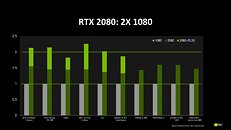Apr 1st, 2025 14:03 EDT
change timezone
Latest GPU Drivers
New Forum Posts
- Is the futureproof gaming solution a four drive system? (29)
- What's your latest tech purchase? (23441)
- lowering the voltage but performance decreased a lot. (1)
- Rtx 3060 laptop no longer working after wrong vbios flash (19)
- Opened Thaiphoon then crash! (1)
- WCG Daily Numbers (12823)
- Can you guess Which game it is? (53)
- AIO - 120mm cpu cooler? (42)
- Msi Vector 16HX Undervolt (9)
- Rare GPUs / Unreleased GPUs (2049)
Popular Reviews
- DDR5 CUDIMM Explained & Benched - The New Memory Standard
- Sapphire Radeon RX 9070 XT Pulse Review
- ASRock Phantom Gaming B850 Riptide Wi-Fi Review - Amazing Price/Performance
- SilverStone Lucid 04 Review
- Palit GeForce RTX 5070 GamingPro OC Review
- Samsung 9100 Pro 2 TB Review - The Best Gen 5 SSD
- Sapphire Radeon RX 9070 XT Nitro+ Review - Beating NVIDIA
- Enermax REVOLUTION D.F. 12 850 W Review
- Assassin's Creed Shadows Performance Benchmark Review - 30 GPUs Compared
- AMD Ryzen 7 9800X3D Review - The Best Gaming Processor
Controversial News Posts
- MSI Doesn't Plan Radeon RX 9000 Series GPUs, Skips AMD RDNA 4 Generation Entirely (144)
- Microsoft Introduces Copilot for Gaming (124)
- AMD Radeon RX 9070 XT Reportedly Outperforms RTX 5080 Through Undervolting (119)
- NVIDIA Reportedly Prepares GeForce RTX 5060 and RTX 5060 Ti Unveil Tomorrow (115)
- Over 200,000 Sold Radeon RX 9070 and RX 9070 XT GPUs? AMD Says No Number was Given (100)
- NVIDIA GeForce RTX 5050, RTX 5060, and RTX 5060 Ti Specifications Leak (96)
- Retailers Anticipate Increased Radeon RX 9070 Series Prices, After Initial Shipments of "MSRP" Models (90)
- China Develops Domestic EUV Tool, ASML Monopoly in Trouble (88)
Wednesday, August 22nd 2018

NVIDIA Releases First Internal Performance Benchmarks for RTX 2080 Graphics Card
NVIDIA today released their first official performance numbers for their new generation of GeForce products - particularly, the RTX 2080. The RTX 20 series of graphics cards, according to the company, offers some 50% performance improvements (on average) on architectural improvements alone, in a per-core basis. This number is then built upon with the added RTX performance of the new RT cores, which allows the RTX 2080 to increase its performance advantage over the last generation 1080 by up to 2x more - while using the new DLSS technology. PUBG, Shadow of the Tomb Raider, and Final Fantasy XV are seeing around 75 percent or more improved performance when using this tech.
NVIDIA is also touting the newfound ability to run games at 4K resolutions at over 60 FPS performance, making the RTX 2080 the card to get if that's your preferred resolution (especially if paired with one of those dazzling OLED TVs...) Of course, IQ settings aren't revealed in the slides, so there's an important piece of the puzzle still missing. But considering performance claims of NVIDIA, and comparing the achievable performance on last generation hardware, it's fair to say that these FPS scores refer to the high or highest IQ settings for each game.
NVIDIA is also touting the newfound ability to run games at 4K resolutions at over 60 FPS performance, making the RTX 2080 the card to get if that's your preferred resolution (especially if paired with one of those dazzling OLED TVs...) Of course, IQ settings aren't revealed in the slides, so there's an important piece of the puzzle still missing. But considering performance claims of NVIDIA, and comparing the achievable performance on last generation hardware, it's fair to say that these FPS scores refer to the high or highest IQ settings for each game.
Apr 1st, 2025 14:03 EDT
change timezone
Latest GPU Drivers
New Forum Posts
- Is the futureproof gaming solution a four drive system? (29)
- What's your latest tech purchase? (23441)
- lowering the voltage but performance decreased a lot. (1)
- Rtx 3060 laptop no longer working after wrong vbios flash (19)
- Opened Thaiphoon then crash! (1)
- WCG Daily Numbers (12823)
- Can you guess Which game it is? (53)
- AIO - 120mm cpu cooler? (42)
- Msi Vector 16HX Undervolt (9)
- Rare GPUs / Unreleased GPUs (2049)
Popular Reviews
- DDR5 CUDIMM Explained & Benched - The New Memory Standard
- Sapphire Radeon RX 9070 XT Pulse Review
- ASRock Phantom Gaming B850 Riptide Wi-Fi Review - Amazing Price/Performance
- SilverStone Lucid 04 Review
- Palit GeForce RTX 5070 GamingPro OC Review
- Samsung 9100 Pro 2 TB Review - The Best Gen 5 SSD
- Sapphire Radeon RX 9070 XT Nitro+ Review - Beating NVIDIA
- Enermax REVOLUTION D.F. 12 850 W Review
- Assassin's Creed Shadows Performance Benchmark Review - 30 GPUs Compared
- AMD Ryzen 7 9800X3D Review - The Best Gaming Processor
Controversial News Posts
- MSI Doesn't Plan Radeon RX 9000 Series GPUs, Skips AMD RDNA 4 Generation Entirely (144)
- Microsoft Introduces Copilot for Gaming (124)
- AMD Radeon RX 9070 XT Reportedly Outperforms RTX 5080 Through Undervolting (119)
- NVIDIA Reportedly Prepares GeForce RTX 5060 and RTX 5060 Ti Unveil Tomorrow (115)
- Over 200,000 Sold Radeon RX 9070 and RX 9070 XT GPUs? AMD Says No Number was Given (100)
- NVIDIA GeForce RTX 5050, RTX 5060, and RTX 5060 Ti Specifications Leak (96)
- Retailers Anticipate Increased Radeon RX 9070 Series Prices, After Initial Shipments of "MSRP" Models (90)
- China Develops Domestic EUV Tool, ASML Monopoly in Trouble (88)


107 Comments on NVIDIA Releases First Internal Performance Benchmarks for RTX 2080 Graphics Card
I really expected less, about +30%, basically 1080Ti level of performance. Looks like it's going to be faster than 1080Ti, 5-10% in most games, close to 20% in games that use async and stuff.
They claimed 1.7x over 980 with 1080, while TPU only shows 66-69%, liars.....
btw lol at people who don't understand 1080 performance is 1.0x (100%) of 1080 performance :roll::roll::roll:
Also,if they can achieve +50% on a 2944 CUDA 256-bit 12nm card, then Vega 7nm better be at least 1.75x of Vega 10, or else 7nm nvidia cards will come a year late with $700 for 3070.
I think he's one of the better ones, but I do believe he's got rather big like Linus and that kinda goes to your head, or anyones for that matter I'd guess...
What NVIDIA did is they changed the price segment of their cards, a simple yet effective strategy that make people believe that that their products are much better than they really are. People will compare RTX 2080 to GTX 1080 forgetting that now they need to pay as much as for a 1080 Ti card. I don't think this is fair. That is why I also consider 2080 Ti to be an upgrade to Titan, 2080 to 1080 Ti and 2070 to 1080 and I think it's best to compare them in this way.
Let’s use a Mercedes C class car. Next year they make a new c class and it is faster, accelerated faster, handles faster and brakes faster than the previous year’s E class. Naturally it costs a lot more also.
Does that make it a replacement for the E class? No, it doesn’t, it is just a better C class, because the E class also improved by the same margins.
In the same way, the cards, which all fall into the same product stack at the same places as the previous year only replace their own model. It is completely based upon the chips used. Price and performance have nothing to do with it. We expect them to always improve.
My comment was strictly from the consumer standpoint and not from general technological advancement in the field. What I care as a consumer is that right now I need to spend a lot more for a successor than I expected. I anticipated that the price for RTX 2080 would be more or less the same as GTX 1080 on release day. That is not the case and RTX 2080 costs a lot more - in fact it costs as much as a more expensive model from previous generation. Now, let's say that I want to buy a new card and I can spend $700 on it. Right now I have two options: RTX 2080 or GTX 1080 Ti. Which one should I buy? Let's say that as a consumer I want the best performance for the buck. Why would I be interested in comparing RTX 2080 to plain GTX 1080? It's not in the same price range anymore. From the buyers perspective my reference point becomes GTX 1080 Ti because it costs about the same. That's what I tried to convey; if I'm spending money on a new card I'm going to compare it to a card in the same price range. Therefore I'm more interested in comparing RTX 2080 to GTX 1080 Ti because for me it's strictly a matter of cost-effectiveness. Yes, the price is higher because NVIDIA needs to get their money back for R&D and probably it's more expensive to manufacture the whole chip. But frankly, as a consumer, I don't give a damn.
However, as you have pointed out correctly, the price difference this time is such a huge increase, it is forcing people to buy down one model tier or more, just to be able to buy a new card.
I feel your pain!
I laugh at the idea that nearly the best GPU in the stack can barely use these new features at 1080@60
I too could afford 2080Ti easily,but it's not even about the price,rather about the card itself. I'm not buying such a huge die on 12nm in 2018, better get a placeholder like 2070 with good price/perf ratio that will still be +20-30% over my 1080 (allegedly) and then go big in 2020 when new consoles drop and nvidia is out with 7nm.
If 2070 doesn't deliver that +20-25% though, I'll not buy any RTX card most likely,maybe a 1080Ti but only if price plummets below 2070 level. I'd like a new card though, cause next year I won't get any good money for my gtx 1080 when it's out of warranty.
DigiTimes: NVIDIA Forced AIBs to Absorb Glut of 10-Series GPUs
videocardz.com/77763/nvidia-geforce-rtx-2080-3dmark-timespy-result-leaks-out